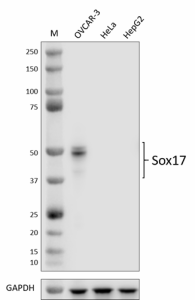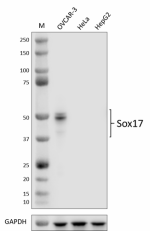- Clone
- O92B6.Rec (See other available formats)
- Regulatory Status
- RUO
- Other Names
- Transcription factor SOX17, Transcription factor SOX 17, Transcription factor SOX-17, VUR3, SRY-Box17, SRY-Related HMG-Box Transcription Factor 17
- Isotype
- Mouse IgG1, κ
- Ave. Rating
- Submit a Review
- Product Citations
- publications

-

Whole cell extracts (15 μg total protein) from indicated cell lines were resolved by 4-12% Bis-Tris gel electrophoresis, transferred to a PVDF membrane, and probed with 1 μg/mL of Purified anti-SOX17 Recombinant (clone O92B6.Rec) overnight at 4°C. Proteins were visualized by chemiluminescence detection using HRP Goat anti-mouse IgG (Cat. No. 405306). Direct-Blot™ HRP anti-GAPDH (Cat. No. 607903) was used as a loading control at a 1:50000 dilution. Western-Ready™ ECL Substrate Premium Kit (Cat. No. 426319) was used as a detection agent. Lane M: Molecular weight marker -

HepG2 cells (negative cell line, panel A) and OVCAR-3 cells (positive cell line, panel B) were fixed with 4% PFA Fixation Buffer (Cat. No. 420801) for 10 minutes and permeabilized with 100% ice-cold methanol for 10 minutes, and blocked with 5% FBS for 1 hour at room temperature. Cells were then stained with 10 μg/mL of Purified anti-SOX17 Recombinant (clone O92B6.Rec), followed by incubation with Alexa Fluor® 594 Goat anti-mouse IgG (Cat. No. 405326) for 1 hour at room temperature. Nuclei were counterstained with DAPI (Cat. No. 422801). The images were captured on a Revvity Operetta CLS™ High Content Analysis System with a 40X objective. Scale bar: 50 μm -

IHC staining of Purified anti-SOX17 Recombinant (clone O92B6.Rec) on formalin-fixed paraffin-embedded human endometrium tissue. Following antigen retrieval using Tris-EDTA (10 mM Tris, 1 mM EDTA, 0.05% Tween-20, pH 9.0), the tissue was incubated with 10 μg/mL of Purified anti-SOX17 Recombinant (clone O92B6.Rec) followed by incubation with Alexa Fluor® 647 Goat anti-mouse IgG (Cat. No. 405322) (panels A and B) for 1 hour at room temperature. Nuclei were counterstained with DAPI (Cat. No. 422801) (Panel A). Images were captured using a Revvity Operetta CLS™ High Content Analysis System with a 40X objective. Scale bar: 50 μm
| Cat # | Size | Price | Quantity Check Availability | Save | ||
|---|---|---|---|---|---|---|
| 628151 | 25 µg | $190 | ||||
| 628152 | 100 µg | $475 | ||||
SOX17 is an important member of the SOX family of transcription factors, which are defined by possession of a homologous sequence called the HMG (high mobility group) box. SOX genes are primarily involved in developmental processes including germ layer formation, cell-type specification, and organogenesis. SOX17 activates endodermal target genes, and is required for the formation of endoderm and blood vessel endothelium. SOX17 also plays critical roles in the maintenance of fetal and neonatal hematopoietic stem cells. Additionally, SOX17 is a regulator of human primordial germ cell fate.
SOX17 also acts as a tumor suppressor through suppression of Wnt signaling, and a reduction of SOX17 expression is found in gastrointestinal and colon carcinomas. Additionally, mutations in SOX17 can induce stem-like characteristics in tumor cells by causing SOX17 to dimerize with OCT4 and induce pluripotency transcriptional programs.
Product Details
- Verified Reactivity
- Human
- Antibody Type
- Recombinant
- Host Species
- Mouse
- Immunogen
- Recombinant protein expressed in E. Coli corresponding to residues 177-414 of human SOX17
- Formulation
- Phosphate-buffered solution, pH 7.2, containing 0.09% sodium azide and 50 mM sodium citrate
- Preparation
- The antibody was purified by affinity chromatography.
- Concentration
- 0.5 mg/mL
- Storage & Handling
- The antibody solution should be stored undiluted between 2°C and 8°C.
- Application
-
WB - Quality tested
ICC, IHC-P - Verified - Recommended Usage
-
Each lot of this antibody is quality control tested by western blotting. For western blotting, the suggested use of this reagent is 0.25 - 1.0 µg/mL. For immunocytochemistry, a concentration range of 5.0 - 10.0 μg/mL is recommended. For immunohistochemistry, a concentration range of 1.0 - 10.0 µg/mL is suggested. It is recommended that the reagent be titrated for optimal performance for each application.
- Application Notes
-
This antibody (clone O92B6.Rec) does not cross-react with mouse SOX17 in western blot (WB).
For immunohistochemistry (IHC), we recommend antigen retrieval with either Tris-EDTA (10 mM Tris, 1 mM EDTA, 0.05% Tween-20, pH 9.0) or Sodium Citrate (Cat. No. 928502).
For immunocytochemistry (ICC), we recommend fixation with Fixation Buffer (Cat. No. 420801) followed by permeabilization with either 100% ice-cold methanol or 0.5% Triton-X. Fixation and permeabilization with 100% ice-cold methanol alone is not recommended. - RRID
-
AB_3097533 (BioLegend Cat. No. 628151)
AB_3097533 (BioLegend Cat. No. 628152)
Antigen Details
- Structure
- SOX17 is a 414 amino acid protein with a predicted molecular weight of 44.1 kD.
- Distribution
-
Nucleus
- Function
- Transcription factor
- Interaction
- Interacts with CTNNB1, LEF1, TCF4
- Biology Area
- Cell Biology, Signal Transduction, Transcription Factors
- Antigen References
-
- Wegner M. 1999. Nucleic Acids Res. 27:1409-20.
- Du YC, et al. 2009. Gastroenterology. 137:1346-57.
- Zorn AM, et al. 1999. Mol Cell. 4:487-98.
- Sinner D, et al. 2004. Development. 131:3069-80.
- Hudson C, et al. 1997. Cell. 91:397-405.
- Matsui T, et al. 2006. J Cell Sci. 119:3513-26.
- Kim I, et al. 2007. Cell. 130:470-83.
- Zhang W, et al. 2008. Cancer Res. 68:2764-72.
- Tan DS, et al. 2020. Semin Cancer Biol. 67:65-73.
- Irie N, et al. 2015. Cell. 160:253-68.
- Gene ID
- 64321 View all products for this Gene ID
- UniProt
- View information about SOX17 on UniProt.org
Related Pages & Pathways
Pages
Related FAQs
Other Formats
View All SOX17 Reagents Request Custom Conjugation| Description | Clone | Applications |
|---|---|---|
| Purified anti-SOX17 Recombinant Antibody | O92B6.Rec | WB,ICC,IHC-P |
| Alexa Fluor® 647 anti-SOX17 Recombinant Antibody (For Flow Cytometry) | O92B6.Rec | ICFC |
| Alexa Fluor® 647 anti-SOX17 Recombinant Antibody (for IHC and ICC) | O92B6.Rec | IHC-P,ICC |
Compare Data Across All Formats
This data display is provided for general comparisons between formats.
Your actual data may vary due to variations in samples, target cells, instruments and their settings, staining conditions, and other factors.
If you need assistance with selecting the best format contact our expert technical support team.
-
Purified anti-SOX17 Recombinant Antibody

Whole cell extracts (15 μg total protein) from indicated cel... 
HepG2 cells (negative cell line, panel A) and OVCAR-3 cells ... 
IHC staining of Purified anti-SOX17 Recombinant (clone O92B6... -
Alexa Fluor® 647 anti-SOX17 Recombinant Antibody (For Flow Cytometry)

OVCAR-3 cells (positive control, filled histogram), and HeLa... -
Alexa Fluor® 647 anti-SOX17 Recombinant Antibody (for IHC and ICC)

IHC staining with Alexa Fluor® 647 anti-SOX17 was performed ... 
OVCAR-3 cells (positive cell line, top panels), or HeLa cell...
 Login/Register
Login/Register 







Follow Us